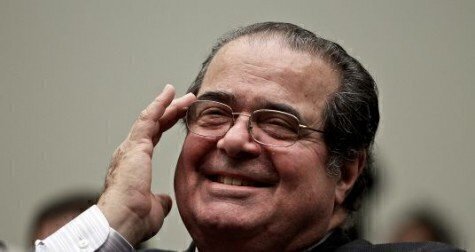Justice Antonin Scalia was known for his well-written Supreme Court opinions and his obscure word choices. On the anniversay of his passing last year, here’s a look at some Scaliaisms that remain with us today.

The ever-quotable Justice gave a lengthy interview to New York magazine in 2013, where he stumped writer Jennifer Senior with the word “ukase” in the following exchange about the power of the Supreme Court to strike down the Defense of Marriage Act.
Scalia said such a decision was “not at the ukase of a Supreme Court.” When Senior’s response was simply, “What?” the Justice spelled out the word and defined it like a Spelling Bee judge. “U-K-A-S-E. Yeah. I think that’s how you say it. It’s a mandate. A decree,” Scalia said.
And the Justice was correct. The Merriam-Webster definition of ukase is “a proclamation by a Russian emperor or government having the force of law.”
In past years, Scalia had befuddled some observers and delighted Scrabble fans and word geeks with two other word choices. In his DOMA dissent, Scalia categorized the majority opinion, which struck down DOMA, as “legalistic argle-bargle.”
Ben Zimmer, who writes about words and language for The Wall Street Journal and produces Visual Thesaurus and Vocabulary.com, carefully explained the origins of “argle-bargle” on the Visual Thesaurus blog in June as a description of "a verbal dispute" or "a wrangling argument." Zimmer also acknowledged he wasn’t that familiar with the word choice that Scalia used.
Another term used by Scalia has a bigger following on the Internet but is still not used in popular conversation: panopticon. In his dissent in Maryland v. King, a case about taking DNA samples from arrest suspects, Scalia warned of the dangers of a “genetic panopticon.” Scalia was alluding to a plan from 1791 from Jeremy Bentham to build a prison called the panopticon that would allow guards to see prisoners at all times, while the prisoners could never see their guards.
That’s not the first time Scalia had talked about the use of historic architecture. Back in 2000 in Dickerson v. U.S., Scalia lamented about a ruling that “converts Miranda from a milestone of judicial overreaching into the very Cheops’ Pyramid (or perhaps the Sphinx would be a better analogue) of judicial arrogance.”
In one of his early dissents, Johnson v. Transportation Agency in 1987, Scalia quoted Shakespeare, using an exchange from Henry IV to speak about “spirits from the vasty deep.” And there was the historic battle in 2009 involving Scalia and a presenting lawyer over the use of the word “choate” in a case argument.
Randolph Barnhouse was arguing about a “choate” interest in property. “There is no such adjective,” Scalia said. “I know we have used it, but there is no such adjective as 'choate.' There is 'inchoate,' but the opposite of inchoate is not choate."
In a 2010 New York Times story, Zimmer explained it wasn’t the first time that Scalia took an attorney for using choate in his courtroom. In 1992, another attorney took a Scalia upbraiding during oral arguments for using the word.
But Scalia wasn't always been on the positive side of a word-choice critique. No less an authority than William Safire investigated Scalia’s claims about the usage of the word “modify,” which was at the center of majority decision Scalia wrote in MCI v. AT&T in 1994.
Safire examined the arguments in the court of grammatical opinion in a column called "Scalia v. Merriam-Webster.” In his opinion, Scalia said that MCI had misused the word “modify” and he pointed to the Merriam-Webster definition as supporting his case.
Safire contacted the dictionary’s editor in chief, who said Scalia didn’t exactly interpret the definition correctly. "I regret having to say that Judge Scalia is in error on this matter, but at least he has the satisfaction of knowing that his error is not reversible by a higher court," said Frederick C. Mish.







